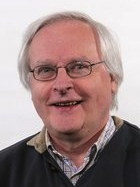Go to
Layout synthesis: A golden DA topic
Mini Course
2-3 February 2016, 10:15 - 16:00, EPFL, Room: INF 328
Instructor: Prof. Ralph Otten
The course will be on algorithms in layout synthesis. Most problems cannot be "efficiently" solved by polynomial-time algorithms. We therefore start the course by several heuristics in solving a classical layout problem. That will give us an inventory of fruitful approaches to other problems in the area. We will go in depth when algorithms have a wider application to intractable problems in general. Stochastic optimization will conclude the first day, while trade-off approaches will finish off the course. On the way a plethora of 'classical' layout solutions will be systematically presented.
| Tuesday, 2 February 2016 |
|
| Block 1: Coping with hard problems |
|
| 10:15 - 11:00 | The channel routing problem Classical formulation |
| 11:15 - 12:00 | From doglegs to contours Routing |
| 12:15 - 14:00 | Lunch - offered to those who take the course |
| Block 2: Stochastic optimization |
|
| 14:15 - 15:00 | High level problems in layout synthesis Partitioning, global placement |
| 15:15 - 16:00 | Local search Annealing |
| Wednesday, 3 February 2016 |
|
| Block 3: Floorplan design |
|
| 10:15 - 11:00 | Structural restraints |
| 11:15 - 12:00 | Efficient optimization Paradigms |
| 12:15 - 14:00 | Lunch - offered to those who take the course |
| Block 4: Design closure |
|
| 14:15 - 15:00 | Iteration free design |
| 15:15 - 16:00 | Timing closure Pareto algebra |
About the instructor:
 Ralph Otten has been active in research in automation of layout synthesis for more than 40 years. He finished his phd-thesis in 1976 on the automatic layout synthesis for bipolar integrated circuits, a topic still very actual today. While in the mathematics department of IBM Research in Yorktown Heights he continued this research by embedding it in the Yorktown Silicon Compiler, aiming at translating a functional description into the masks of an integrated circuit. From 1987 he worked at Delft University and Eindhoven University with research on closure problems in Design Automation. At both universities he also directed the developments in EE curricula.
Ralph Otten has been active in research in automation of layout synthesis for more than 40 years. He finished his phd-thesis in 1976 on the automatic layout synthesis for bipolar integrated circuits, a topic still very actual today. While in the mathematics department of IBM Research in Yorktown Heights he continued this research by embedding it in the Yorktown Silicon Compiler, aiming at translating a functional description into the masks of an integrated circuit. From 1987 he worked at Delft University and Eindhoven University with research on closure problems in Design Automation. At both universities he also directed the developments in EE curricula.
Secondary navigation
- EPFL Workshop on Logic Synthesis and Emerging Technologies
- Luca Amaru
- Luca Benini
- Giovanni De Micheli
- Srini Devadas
- Antun Domic
- Rolf Drechsler
- Pierre-Emmanuel Gaillardon
- Jie-Hong Roland Jiang
- Akash Kumar
- Shahar Kvatinsky
- Yusuf Leblebici
- Shin-ichi Minato
- Alan Mishchenko
- Vijaykrishnan Narayanan
- Ian O'Connor
- Andre Inacio Reis
- Martin Roetteler
- Julien Ryckaert
- Mathias Soeken
- Christof Teuscher
- Zhiru Zhang
- Symposium on Emerging Trends in Computing
- Layout synthesis: A golden DA topic
- EPFL Workshop on Logic Synthesis & Verification
- Luca Amaru
- Luca Benini
- Robert Brayton
- Maciej Ciesielski
- Valentina Ciriani
- Jovanka Ciric-Vujkovic
- Jason Cong
- Jordi Cortadella
- Giovanni De Micheli
- Antun Domic
- Rolf Drechsler
- Henri Fraisse
- Paolo Ienne
- Viktor Kuncak
- Enrico Macii
- Igor Markov
- Steven M. Nowick
- Tsutomu Sasao
- Alena Simalatsar
- Leon Stok
- Dirk Stroobandt
- Tiziano Villa
- Symposium on Emerging Trends in Electronics
- Raul Camposano
- Anantha Chandrakasan
- Jo De Boeck
- Gerhard Fettweis
- Steve Furber
- Philippe Magarshack
- Takayasu Sakurai
- Alberto Sangiovanni-Vincentelli
- Ken Shepard
- VENUE
- Panel on Circuits in Emerging Nanotechnologies
- Panel on Emerging Methods of Computing
- Panel on The Role of Universities in the Emerging ICT World
- Panel on Design Challenges Ahead
- Panel on Alternative Use of Silicon
- Nano-Bio Technologies for Lab-on-Chip
- Functionality-Enhanced Devices Workshop
- More Moore: Designing Ultra-Complex System-on-Chips
- Design Technologies for a New Era
- Nanotechnology for Health
- Secure Systems Design
- Surface Treatments and Biochip Sensors
- Security/Privacy of IMDs
- Nanosystem Design and Variability
- Past Events Archive

